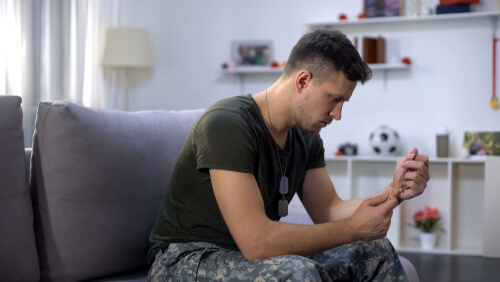Stigma Impacts Substance Abuse and Mental Health Care in Veterans
Stigma in the Military

Stigmas are attitudes and behaviors surrounding certain aspects of a person that may be perceived as bad—such as mental health issues—that can be demoralizing to that person.2 Stigma may exist in a variety of contexts. These different contexts can include:2,9,10
- Self-stigma—thoughts of oneself may lead to feeling ashamed or unconfident in seeking care for mental health.
- Anticipated stigma—feeling as if you may be treated differently at some point in the future because of prejudice or negative stereotyping.
- Public stigma—collectively-negative beliefs may lead to widespread discrimination against members of the group who have mental health problems.
Military culture values teamwork, toughness, and self-reliance. In some situations, these same values may serve to promote stigma. For example, military personnel may be concerned that seeking care will hinder their effectiveness and possibly limit their military career.2
Common concerns about seeking mental health care include being treated differently by military leadership, being blamed for the problem, being seen as weak, others losing confidence in them, embarrassment, and impact on their career.2
Stigma and Military Concerns
The Department of Defense initiated changes to reduce stigma and encourage treatment for mental health disorders and substance abuse. Efforts include a mandate for developing a supportive culture around seeking mental health and substance use services.3 Mental well-being was recognized as a key component of health, and polarized assessments of being either “ready” or “unfit/ill” are being replaced with a continuum of preparedness for service and an increased diversity of supportive personnel.3, 4
The Army has responded by training leadership on how to foster a supportive culture and reduce stigma, in addition to establishing psychological health care services available during non-duty hours, and developing educational material aimed at reducing stigma.3
Combat Operational Stress Control programs incorporate mental health and substance abuse treatment providers into the fitness and preventative services of each unit.5
Embedded Behavioral Health teams have also been established, increasing the number of mental health personnel to foster positive relationships with leadership, encouraging people to talk about mental health, and promoting positive attitudes about seeking mental health and substance abuse treatment.3
Military Pathways is a program designed to improve mental health through self-directed activities available in an online portal, including self-assessments, mental health education, and referral to services.3
The Real Warriors Campaign provides educational materials about seeking treatment for military service members, Veterans, and family members. Materials are shared widely and highlight that mental health and substance use are not uncommon, seeking help is a strength, asking for help does not end a career, and no one is alone in their quest for improved mental well-being.3
Watch our addiction talk where Veterans discuss the stigma of addiction.
Military Stigma Affecting Veterans
Past estimates from the Substance Abuse and Mental Health Services Administration (SAMSHA) have indicated that, of Veterans with substance use disorders, more than three-quarters of them struggle with alcohol abuse and over one-quarter struggle with illicit drug abuse, in addition to 24.7% of Veterans with mental illness having a serious mental illness.6 Although many Veterans struggle with these challenges, roughly 60% of Veterans that would benefit from care do not seek needed treatment—with stigma playing a potential role.2
Military values such as self-sufficiency and prioritizing needs often continue after active duty service, and stigma about mental health or substance abuse treatment may impact a Veteran’s thought process in seeking treatment.7
Efforts to address stigma in Veterans include educating military leadership, changing the culture of seeking mental health care,3 and Veteran-specific programs aimed at decreasing stigma and engaging Veterans in care.7, 8
Seeking Help
Many organizations offer mental health services for military personnel, Veterans, and family members. For Veterans, the Veterans Crisis Line is available 24/7 at 1-800-273-8255, then press 1. The Veterans Crisis Line also has options to talk with a professional through online chat or text.
The SAMHSA Help Line is available for those seeking substance abuse treatment. Information specialists are available 24/7 at 1-800-662-HELP (4357), and the website also provides information and resources.
American Addiction Centers (AAC) is also just a phone call away, . We’re available 24/7 to answer questions about your or a loved one’s substance abuse and can provide information about treatment options.
Service Members Seeking Help
- Military Health System has information about mental health services and an online tool to search for local services and support.
- Military OneSource provides information on substance abuse treatment, including how to find and enroll in alcohol and drug abuse treatment.
- Wounded Warrior Project assists service members who are transitioning out of the military, Veterans, and their families with accessing Veterans benefits, physical health and wellness resources, resources for mental health, and finding others in the Veteran community.
Veterans Seeking Help
- VA Mental Health services include mental health and substance abuse treatment through in-person appointments, telehealth appointments, and online information. VA providers are licensed specialists and peer support specialists who are also Veterans are available for additional guidance.
- Ending Self Stigma is a VA program that offers group sessions focused on mental health and decreasing self-stigma through evidence-based strategies.
- Headstrong provides confidential and stigma-free mental health services and support to post-9/11 Veterans and their families.
- Make the Connection offers services including information on mental health issues, local mental health services, and resources.
Veteran Program
The American Addiction Centers Veteran program offers a range of services to facilitate recovery from addiction specifically for Veterans and first responders. Our unique approach includes:
- Group therapy.
- Development of coping skills.
- Nutrition education and exercise.
- Pain management and emotional regulation training.
Though stigma can be a barrier to seeking treatment for mental health and substance abuse problems, military and Veteran-specific programs are available. Specialists in mental health and substance use recovery are here to help. You are not alone.